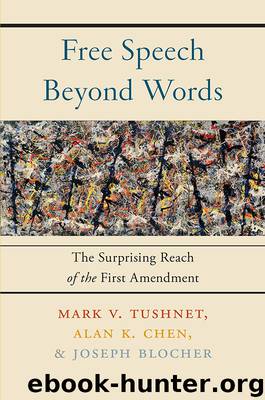Free Speech Beyond Words by Mark V. Tushnet & Alan K. Chen & Joseph Blocher

Author:Mark V. Tushnet & Alan K. Chen & Joseph Blocher
Language: eng
Format: epub
Tags: LAW000000 Law / General
Publisher: NYU Press
C. Making the Most of the First Amendment’s Linguistic Turn
Endorsing use meaning as an alternative to representational meaning is relatively easy; implementing it is not. It should by now be apparent that the boundaries of the First Amendment cannot be explained on the basis of the relationship between language and extralinguistic facts, as the representational-meaning approach would suggest. But to say that those boundaries do or should depend instead on language games raises a new, albeit more useful, set of questions. This section explores a few of them.
First, by focusing on language games rather than on the connection between words and ideas, the approach here would exclude from First Amendment coverage acts that, despite being “communicative” in some sense, are not traditionally recognized as “speech.” This could explain why many prominent First Amendment scholars have rejected a generalist account of the constitutional value of form,201 focusing instead on the transmission of ideas.202
This objection is difficult and deceptively complex, as is the best answer to it: that such activities, whatever relationships they might have with the First Amendment’s values, simply are not speech. Consider Jed Rubenfeld’s example of a person who speeds to express disapproval of speed limits203 or Tushnet’s example of ticket scalping in chapter 2. These activities arguably further First Amendment values by advancing the autonomy interests of those who are engaged in them and perhaps even communicate ideas. But so do innumerable other activities, from terrorist attacks to rape. Prohibition of those activities is perfectly constitutional under the First Amendment not because the government interest in doing so is sufficiently strong but because they are not thought to implicate the First Amendment at all. To borrow Schauer’s terminology, they are uncovered, not merely unprotected.204
The question of what constitutes “speech” is, in turn, an old one for First Amendment theory and doctrine, and the difficulty of articulating anything like a precise definition is familiar. This chapter has focused on one possible component of speech—meaning—not the concept of speech as a whole. The two inquiries might be distinct; perhaps meaning must be accompanied by a volitional act or utterance to constitute speech. To the degree that the discussion here provides lessons for the quest to define speech itself, it is that the answers probably lie in social practices rather than in formal logic. In the end, as Schauer explains, “the very idea of free speech is a crude implement, to the core, protecting acts that its background justifications would not protect, and failing to protect acts that its background justifications would protect.”205
But the crudeness of the implement raises another and perhaps equally foundational challenge for the use-meaning approach: negotiating the tension between the First Amendment’s desire for clear boundaries and language games’ resistance to them. As to the former, the importance of clarity in First Amendment doctrine is recognized as valuable in its own right.206 Language games, however, are a poor guide for establishing clear boundaries. Both in their definition and in their behavior, language games “lack purity.”207 Post, whose
Download
This site does not store any files on its server. We only index and link to content provided by other sites. Please contact the content providers to delete copyright contents if any and email us, we'll remove relevant links or contents immediately.
You Don't Own Me by Orly Lobel(1147)
Hello, My Name is Awesome by Alexandra Watkins(1087)
Intellectual Property Strategy by John Palfrey(1083)
Without Copyrights by Spoo Robert(980)
Democracy of Sound by Alex Sayf Cummings(964)
Profit From Your Idea: How to Make Smart Licensing Deals by Attorney Richard Stim(942)
World War 3.0 by Ken Auletta(906)
A Triumph of Genius: Edwin Land, Polaroid, and the Kodak Patent War by Ronald K. Fierstein(904)
The Trademark Guide by Lee Wilson(897)
Kafka's Last Trial by Benjamin Balint(850)
Data Protection: A Practical Guide to UK and EU Law by Carey Peter(843)
Patent It Yourself: Your Step-by-Step Guide to Filing at the U.S. Patent Office by Pressman David Attorney(822)
What They'll Never Tell You About the Music Business by Peter M. Thall(819)
Mass Media Law by Pember Don & Pember Don(815)
BVR's Guide to Intellectual Property Valuation by Michael Pellegrino(814)
Hello, My Name Is Awesome: How to Create Brand Names That Stick (BK Business) by Alexandra Watkins(809)
The Tech Contracts Handbook: Software Licenses and Technology Services Agreements for Lawyers and Businesspeople by David Tollen(794)
The Copywriter's Handbook by Robert W. Bly(789)
The New Censorship: Inside the Global Battle for Media Freedom by Joel Simon(770)
